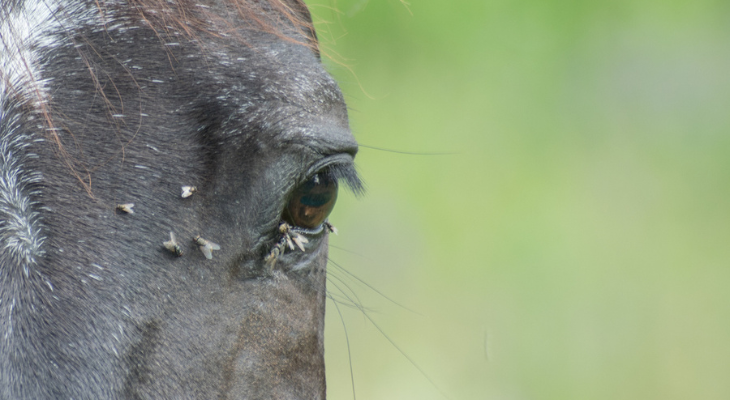September Newsletter: The Importance of Parasite Control for Horses
- Created in Newsletter Library

The Importance of Parasite Control for Horses
Pests consider your horse's body the perfect place to call home. Unfortunately, parasites can cause health problems ranging from poor coat condition to colic and Eastern Equine Encephalitis. Following recommended parasite control measures is the key to keeping your horses healthy and comfortable.
Make Pasture Control a Priority
Horses pick up many external and internal parasites when grazing, including strongyles. Both large and small strongyle larvae cling to blades of grass in the pasture. When your horse takes a bite, the larvae enter the horse's digestive system, where they mature. Large strongyles move from the digestive system to the organs and back and can damage the lining of blood vessels or organs and may even cause death.
Small strongyles remain in the digestive system and cause colic, diarrhea, slow growth, and weight loss when they become active. Other parasites your horse might ingest in the pasture include tapeworms, pinworms, and ascarids.
Reducing your horse's risk for illness from these parasites starts with:
- Limiting the Number of Horses in a Pasture. Too many horses in the pasture means not enough grass to eat. The Penn State Extension notes that horses will resort to grazing in rough areas of taller grass if the height of pasture grass is 3 inches or lower. Parasites are drawn to manure piles often found in the rough. As a result, the grass in the rough may have a higher number of parasites.
- Rotating Pastures. Grass that's too tall offers more room for parasites, while short grass forces horses to venture into the rough. When the grass is lower than 3 inches, it's time to move horses to another pasture.
- Keeping Manure Under Control. Dragging your pastures a few times a year breaks apart manure piles and speeds drying, according to the University of Minnesota Extension. This helps to reduce the overall number of parasites present in a pasture.
- Mowing. Mowing reduces weeds and helps control parasites. Kentucky Equine Research recommends keeping grass at 6' to 8' by mowing every two weeks during the spring. During the drier summer months, you may need to mow less often to maintain the ideal grass length.
Protect Your Horse from Insects
Flying insects are more than just an annoyance. Buzzing flies irritate your horse's eyes and can cause conjunctivitis (pink eye), while biting flies dig into your horse's flesh, causing painful bumps. Mosquitoes carry several diseases, including Eastern and Western Equine Encephalitis and West Nile Virus. Ticks also cause diseases, while lice cause hair loss and itching.
Fly reduction strategies include:
- Turning on a Fan. Fans placed near stalls keep mosquitoes and flies away from your horses.
- Manure Management. The placement of your manure pile matters when it comes to controlling flying insects. Choose a place far from the stable and immediately transfer manure to the pile after mucking out stalls.
- Eliminating Standing Water. Get rid of standing water in pastures and repair leaky roofs and windows in stables. Empty rain barrels promptly and clean and disinfect troughs and automatic waterers often.
- Using Sprays. Apply insect repellant spray to the walls, roofs, and exposed surfaces of stables and sheds every four to six weeks. Use fly spray to keep flying insects from bothering your horses. Fly spray keeps flying insects away for one to two weeks and offers sweat-proof protection. Don't use insect repellant spray on your horse's body. Check product labels to ensure that a fly spray is safe for your horses.
- Protecting Your Horse's Body. Fly sheets, fly boots, and fly masks help prevent insects from biting your horse or laying eggs on its body.
Provide Deworming Medication at Least Twice a Year
Deworming medication kills internal parasites that can sicken your horse. The recommended dosage varies based upon your horse's fecal egg count. Your veterinarian performs a yearly fecal egg count by examining your horse's manure with a microscope.
Depending on the number of eggs present, your horse will be designated a low, moderate, or high shedder. Lower shedders may only need dewormers in the spring or fall, while moderate and high shedders generally need deworming medication three or four times per year, according to PetMD.
Is your horse struggling with parasites? Give us a call and we'll arrange a visit with the equine veterinarian.
Sources:
University of Minnesota Extension: Managing Established Horse Pastures, 2021
Kentucky Equine Research: Horse Pasture Management, 11/8/2002
https://ker.com/equinews/horse-pasture-management
PetMD: Dewormer for Horses: What You Need to Know, 4/25/2022
https://www.petmd.com/horse/dewormer-horses-what-you-need-know
Penn State Extension: Prevalent Parasites: Common Types of Equine Internal Parasites, 4/28/2021
https://extension.psu.edu/prevalent-parasites-common-types-of-equine-internal-parasites
Penn State Extension: Whole-Farm Management Strategies for Equine Internal Parasites
https://extension.psu.edu/whole-farm-management-strategies-for-equine-internal-parasites


